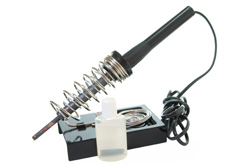Automated lead-free soldering to boost production
Electronics manufacturing, as with many other sectors of the economy, has focused on volume production as a way to minimise costs to both businesses and consumers as well as to better ensure reliability due to fewer changes in processing parameters. In addition, high-volume manufacturing has largely been moved to locations outside the EU where costs are lower. Developing cost-effective and reliable methods to provide low-volume high value-added products is critical not only to numerous small and medium-sized enterprises (SMEs) working on mixed-batch and niche products but also to consumers and businesses looking for something a little different from mass-produced products. Simultaneously, legislation regarding Waste Electrical and Electronic Equipment (WEEE) banning the use of lead, a principal component of conventional solders used to connect parts on printed circuit boards (PCBs), requires the development of new technology difficult for SMEs to attain and thus remain in business. European researchers working on the ‘Flexible soldering cells for agile electronics’ (FLEX-EMAN) project sought to develop automated technology for lead-free soldering of mixed-batch products in order to provide SMEs with the competitive advantage they are seeking. The FLEX-EMAN team developed an automated system consisting of conveyors for PCB transportation, stacked precision reflow soldering chamber (PRSC) ovens for lead-free soldering, a robot for moving PCBs between ovens and conveyor belts, and a supervisory control system for control and monitoring of the process. Researchers also delivered an operational profiles handbook for first-time process setup of a lead-free product within the oven including guidelines for a variety of product types. Commercial exploitation of the FLEX-EMAN prototype has the potential to dramatically increase the competitive position of numerous European electronics manufacturing SMEs.Niche consumer products of high added-value have been produced while encouraging a return to the EU of outsourced manufacturing.







